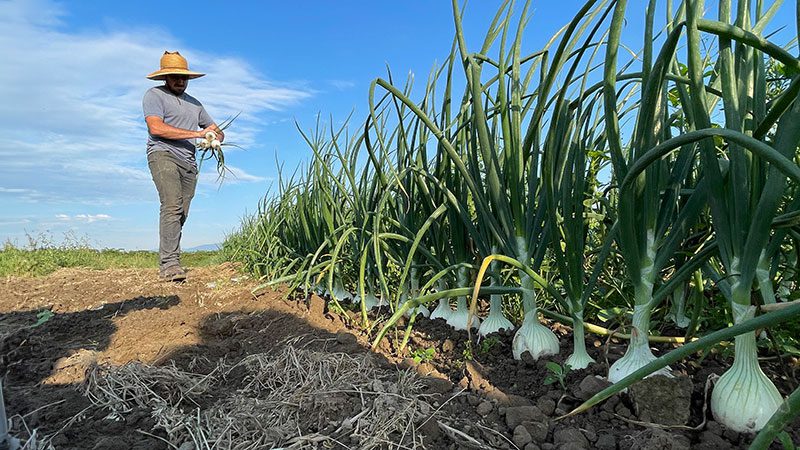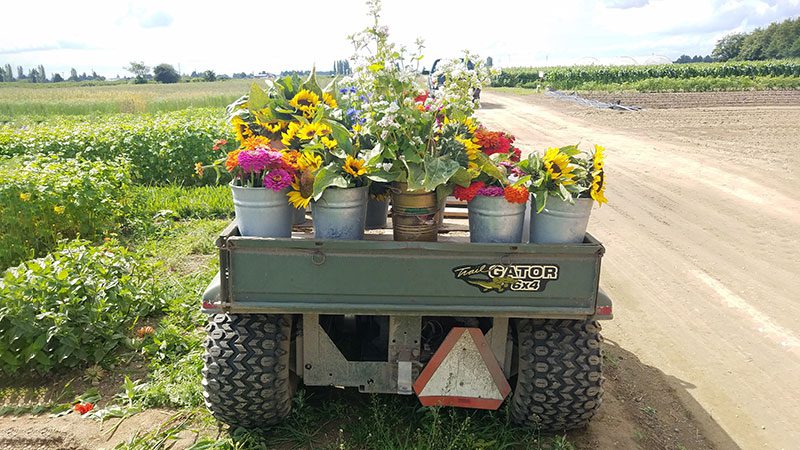Viva Farms brings the future of farming to PCC

Look for a new kind of local produce at three PCC stores this summer.
Salad bars at the Bothell, Bellevue and Edmonds PCC stores will feature freshly harvested fruits and vegetables from Viva Farms, the nonprofit organization that trains and supports aspiring new farmers. Viva has “incubated” 90 new farms to date through an intensive training program, with services including mentorship, access to land, equipment, infrastructure, capital, marketing, and bilingual training. There are currently 34 farms on its land in Skagit and King Counties.
“Viva Farms isn’t just a farm…” said Kyle Scott, PCC’s associate deli merchandiser, who also oversaw an early version of the program at the Bothell PCC last year. “It’s an operation that mirrors a lot of PCC’s values. More farmers are good for the local food ecosystem, and helping support them ripples out to everyone.”
PCC and its members have supported Viva in various ways, including donating money during seasonal fundraisers. But the deli pilot does something different. For one, it allows the new growers, who sometimes work on plots as small as a quarter-acre “micro-farm,” a way for co-op shoppers to buy their produce. It also handles payments differently: Stores give Viva a lump payment at the beginning of the growing season, with each subsequent order subtracted from that payment, rather than being billed when the produce is delivered.
As with Community Supported Agriculture (CSA) programs, these winter payments bridge a gap for farmers, giving them guaranteed sales and a cash infusion at a time when they have bills to pay but nothing yet to harvest. The same concept has successfully fueled the “Growing for Good” collaboration between area hunger relief agencies and farmers.
how federal spending cuts are impacting Viva Farms
Founded in 2009, Viva has been a lifeline for an industry facing an aging crisis: The average age of U.S. farmers has risen to 57.5, and those entering the field face barriers including sky-high land prices and a lack of accessible training.
However, the organization is facing a crisis of its own.
Freezes in federal funding earlier this year meant Viva lost access to more than $5 million of previously approved grants. Those dollars made up 70% of its annual budget, and were already built into its budgets for the next few years. The program, its 34 farms, the 100 jobs they support and $3 million in annual produce sales were at immediate risk of shutting down.
Then the community rallied to raise more than a million dollars for Viva, stabilizing the program for the 2025 season.
“It’s nothing less than amazing that the community did this for us, with us,” said executive director Michael Frazier.
The support allowed the nonprofit to continue construction on a new barn at its Skagit agricultural park allowing farmers to grow more and sell more, providing indoor washing and packing space, temperature-controlled dry storage, and the ability to accommodate 18-wheel delivery trucks and larger orders.
And the training program is “jam-packed,” Frazier said, with demand as high as it’s ever been. There were 38 students in its most recent 8-month training program, and more beginning farmers than available land on Viva’s two properties.

Five new farms got their start this season (see below), four on the Woodinville property and one in Burlington.
In a related win, Songbird Haven Farms, spotlighted in this Sound Consumer article, launched from Viva onto its own independent farm in Thurston County after years of ceaseless searching for land. And plans are still underway to use a $3 million Conservation Futures grant awarded through King County in 2024 to expand to more land in that area, where the demand for services far exceed the current space.
At the PCC pilot, early successes included strawberries, snap peas and salad greens, Scott said – all fitting the program’s mission. “We want to provide our communities with fresh, local produce that’s grown down the street yesterday and is available on our salad bar today.”
All these wins matter — and further the future of Northwest farming — but they don’t translate to runaway profits. If starting up a new farm was easy and profitable, after all, Viva wouldn’t need to exist.
“Starting a farm business, not inheriting a farm business, is a capital and training-intensive endeavor,” Frazier said. Viva is “the runway,” lowering startup costs and providing accessible training for those who don’t inherit land, knowledge, infrastructure, access to capital or the other things a multigenerational family farm can provide.
Despite the community-funded year of stability, leaders have to figure out what’s next.
The federal funds they relied on in the past are either gone, unstable or subject to shifting legal rulings. Two of Viva’s federal grants were unfrozen after the initial shutoffs, but could be frozen or cut again. A different grant was permanently cancelled. Relevant U.S. Department of Agriculture grants have been targeted for elimination, as has other funding for programs to combat climate change and make the business more equitable.
“Climate and/or equity is baked into the program, even though we don’t discriminate against anybody,” Frazier said.
Private donors are probably the nonprofit’s best source of future funding, but a relatively small nonprofit only has so much capacity to fundraise while also doing its work. It’s working on an ongoing fundraising campaign for the future.
“There are a lot of unknowns,” Frazier said.
But he takes a lesson from the farmers that Viva supports.
“You have to be hopeful to do this work. We’re kind of built that same way. We’re moving forward.”
New farmers join Viva Farms
Five new farms started up at Viva this growing season. They are:
- Chaotic Good Farms, a diversified vegetable farm on the Woodinville property. The owners are selling produce through a Community Supported Agriculture program and pop-up farmstand this year, with the goal to “promote the accessibility of local, organic produce to low-income and disabled people, who can face additional barriers affording and preparing fresh produce.” Chaotic Good also received a 2025 Tilth award to help purchase starter supplies such as irrigation drip tape and compost to establish the business.
- Metta Farm, a quarter-acre “microfarm”in Woodinville is intended to grow Asian vegetables that are less commonly found in this region.
- Soul Space Farm, in Woodinville, stands for “Space of Unconditional Love.” The founder has years of experience in vegetable farming in Chicago, and is now focusing on adding herbs and flowers.
- Wild Plate Farm, a quarter-acre plot in Woodinville, includes vegetables, herbs and flowers and says on its website that the focus is “growing soil.” Outlets for its crops include a small CSA, a few restaurants, and outlets like 21 Acres Farm Market.
- LPM Farm on the Skagit farmland, a new member of the incubator program, is focused on growing peas and radishes.
